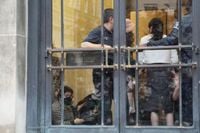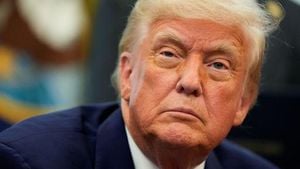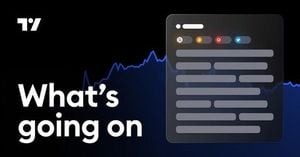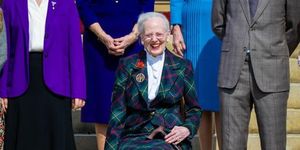New York Police Department officers in riot gear arrested scores of protesters who filled the library at Columbia University on Wednesday, May 7, 2025. This incident marks the latest chapter in ongoing tensions surrounding the Israel-Hamas war, which has ignited significant protests at the Ivy League institution in recent months.
The university requested the NYPD's assistance after a large group of protesters forced their way into the Butler Library, injuring two Columbia Public Safety Officers in the process. According to a statement from the university's president's office, the activists were repeatedly warned to leave the premises, but they refused to comply.
Acting university president Claire Shipman expressed her dismay at the situation, stating, "Requesting the presence of the NYPD is not the outcome we wanted, but it was absolutely necessary to secure the safety of our community." She characterized the protesters' actions as "outrageous," underscoring the university's commitment to maintaining order.
As the protest escalated, police officials reported that "multiple individuals who did not comply with verbal warnings by the NYPD to disperse were taken into custody." Video footage shared on social media depicted masked demonstrators pushing their way into the library, with some activists reportedly chanting slogans against perceived injustices.
The protest involved approximately 60 individuals, with around 30 being escorted out of the building by officers and into police buses. Overall, about 40 arrests were confirmed by Representative Elise Stefanik of New York, who has been vocal in her criticism of the university's handling of the situation.
"The flood shows that as long as Columbia funds and profits from imperialist violence, the people will continue to disrupt Columbia's profits and legitimacy," the activist group Columbia University Apartheid Divest (CUAD) stated on Substack, adding that the demonstration was inspired by Basel al-Araj, a Palestinian activist and writer killed in Ramallah in 2017.
This demonstration comes at a particularly sensitive time for Columbia, as the university is currently negotiating to restore hundreds of millions of dollars in federal funding that the Trump administration pulled earlier this spring. The administration had alleged that the university failed to adequately address antisemitism on campus amid widespread protests related to the war in Gaza.
In March 2025, Columbia announced a series of reforms aimed at meeting the Trump administration's conditions to restore funding. These reforms included a ban on face masks during protests and an expansion of the campus police force, reflecting the administration's demands.
The protests at Columbia are not an isolated incident; they follow a wave of activism that swept across the campus last spring, which included a significant occupation of Hamilton Hall that resulted in over 100 arrests. This earlier protest was part of a broader movement against the university's perceived complicity in global injustices.
In addition to the funding threats, the Trump administration has also taken action against student activists involved in the Palestine movement, including Mohsen Mahdawi, who was released in April 2025, and Mahmoud Khalil, who remains in detention.
As the situation continues to unfold, the university faces mounting pressure to respond effectively to the concerns of its student body while also adhering to federal expectations. The tensions have drawn national attention, with local officials weighing in on the protests.
New York Mayor Eric Adams called the protest "unacceptable" and stated that he had received a "written request" from the university for police backup. Meanwhile, New York Governor Kathy Hochul expressed gratitude to public safety officials for their efforts to maintain order, emphasizing that while peaceful protest is a right, any form of violence or vandalism is intolerable.
Marco Rubio, the Secretary of State, added a sharp note to the discourse, tweeting, "We are reviewing the visa status of the trespassers and vandals who took over Columbia University’s library. Pro-Hamas thugs are no longer welcome in our great nation." This statement highlights the political ramifications that the protests have sparked.
The crackdown on protests at Columbia is emblematic of a larger trend at U.S. universities, where student activism has become increasingly contentious in the wake of the Israel-Hamas conflict. The Trump administration's approach to these protests has drawn criticism from various quarters, with many arguing that it undermines academic freedom and the right to free expression.
As the university navigates these turbulent waters, it remains to be seen how it will balance the demands of federal authorities with the voices of its student body. The outcome of this situation could have lasting implications not only for Columbia but also for universities across the nation as they confront similar challenges.
In the wake of these protests, Columbia University stands at a crossroads, where the demands for justice and accountability clash with institutional pressures and political scrutiny. The unfolding events will likely shape the university's future policies and its relationship with both students and government authorities.




